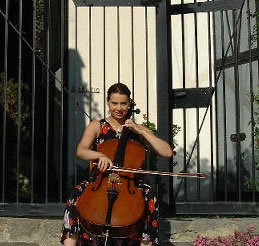Magdalena's Quest
Magda's going to be ok; symphony orchestras have cello sections of between 6 to 10 players, depending on the size of the orchestra, and openings are many and frequent. With her extreme musical ability and her present knowledge of the repertoire, Magdalena is all but assured that at some point in time she will win a position. Of course, once she gets this position she'll have to spend her first year's salary paying back what she's borrowed over the past year to cover her expenses getting to the auditions! Magda is lucky she doesn't play tuba; there is only one tuba position in a symphony orchestra and as luck would have it, young and very good players hold most of them. A tubist, with the same high level of musicality and orchestral experience as Magda, simply does not have the same assuredness of eventually winning a position. So what's a teacher to do? We know that there are some music schools and some teachers that concentrate exclusively on orchestra passages for the duration of a college education. And there are some students who have no interest at all in studying anything other than these passages. That's crazy! That's crazy while only considering the statistics, not to mention the lack of musical growth and the probable resulting neuroses. But there's still a lot more we have to think about and it's not all good! It's difficult to take a hard realistic look at the world of symphony orchestra auditions without becoming a cynic. Did you know, for example, that not all symphony orchestra auditions are fair?! How does a teacher tell that to a young idealistic student? In what ways are symphony auditions unfair? (The cynic says this could be a long essay!) Favoritism is probably the number one problem; it comes in many forms. Nationalism is always a problem; certainly you have a better chance of winning an audition in France if you're French. Of course, this is not necessarily a bad thing. If two players are equal it's only logical to pick the player from the country of the orchestra, but then, when are two players really equal? And when one is selected is it always because he or she is the better of the two? Prejudice is real and it does exist at auditions. Magdalena knows that some orchestras just don't like East Europeans, but it could just as well be Blacks, Jews, Americans, women and the list could go on and on. Whatever you are, there is probably some musician who doesn't like you or wouldn't want to work with you no matter how well you play! I once observed an audition in the 60s where in the finals there was a local favorite, an African-American man from a city thousands of miles away and a woman (a pretty blonde) from a city hundreds of miles away. The drama and dialog that day as the audition took place was something I will never forget. I hope to write a one-act play on it sometime if I can find a way to accurately deal with it and still stay politically correct. Many auditions are held when the orchestra already clearly knows whom they want to fill the position, but the rules require that an audition take place. They don't consider the time, stress and money it takes for the musicians to prepare and make the trip. And this is frequently a surprise to many musicians: In some countries they hold auditions, frequently for every position in the orchestra, when there are really no openings at all; these orchestras get government money to hold auditions; they use auditions as fund raisers! Unfortunately, neither Musical Chairs (www.musicalchairs.com) nor Das Orchester can supply us the specific conditions and “subtleties” of the announced openings, so if we want the job we have to come up with the expenses, make the trip to the audition and compete. And, in our indignation regarding the questionable integrity of audition procedures we must not ignore another part of the ambiguous credibility, which seems equally present. In every audition, some people, most people, return home disappointed. Disappointment leads to frustration, which leads to pain, which frequently leads to anger, and that can lead to lack of clarity. The one thing that is clear is that the post audition reporting by those who competed for the position is frequently historically dubious! That's the way it is. That's the reality we have to face. Music is changing extremely fast, and no one knows for sure the direction that symphony orchestras are going to take; the only thing we do know for sure is that there will be change. We can only guess that there will probably always be some symphony orchestras, albeit probably less. (The cynic might ask now, “why even bother with circumstances like this?”) Because mankind needs music, a musical person needs to play music, and the more music we have in this turbulent world the better off we'll be. There are going to be changes in music and in the business of music, but all we can do is continue our quest, whether it's a cello position for Magdalena or a tuba position for our disproportionately growing tuba community. And who says that a symphony orchestra job is the only pot of gold at the
end of the rainbow? We can explore other possibilities: chamber music, popular
music; we can use our imagination; we can become the best and most thorough
musicians possible and try to anticipate the musical world that we'll be living
in. Need an idea? Start a group that's a fusion of Romanian Gypsy, Irish folk
and Balinese Gamelan! The study of music is a noble quest; enjoy it. |


 My good friend Magdalena is a cellist, a very fine cellist from Romania; for
the past year she's been auditioning for orchestral positions. When she started
this quest to find an orchestra job she was typical of many of the East European
string players, strong on musicality and naïve regarding orchestral repertoire.
That's changed. She now knows all the passages beautifully that a cellist should
expect in an audition plus many passages that are particular to the specific
countries: Spain, Portugal, Finland, Denmark, Sweden, and Norway, where she has
auditioned. She's had an enormous year of traveling and audition experience.
She is also broke!
My good friend Magdalena is a cellist, a very fine cellist from Romania; for
the past year she's been auditioning for orchestral positions. When she started
this quest to find an orchestra job she was typical of many of the East European
string players, strong on musicality and naïve regarding orchestral repertoire.
That's changed. She now knows all the passages beautifully that a cellist should
expect in an audition plus many passages that are particular to the specific
countries: Spain, Portugal, Finland, Denmark, Sweden, and Norway, where she has
auditioned. She's had an enormous year of traveling and audition experience.
She is also broke!